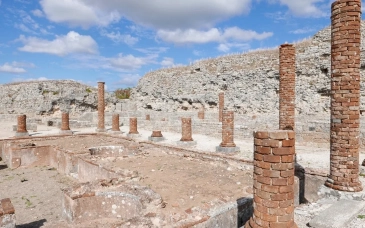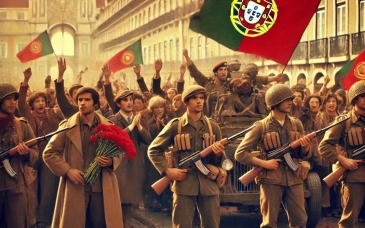The Carnation Revolution, a peaceful military coup that took place on April 25, 1974, dramatically changed Portugal’s political, social, and religious landscape. This unprecedented moment brought an end to nearly fifty years of authoritarian rule under the Estado Novo regime, led first by António de Oliveira Salazar and then by Marcelo Caetano. The revolution initiated sweeping reforms across all facets of Portuguese society, ushering in a new era of democracy, decolonization, and modernization. One of its most significant impacts was the establishment of religious freedom, marking a profound shift from the close alliance between the Estado Novo and the Catholic Church. This article examines the role of religion during the Estado Novo era, the dynamics that led to the Carnation Revolution, and how the revolution transformed religious freedom in Portugal.
Religion Under the Estado Novo: A Union of Church and State
The Concordat of 1940 and the Church-State Alliance
During the Estado Novo era, Catholicism held a privileged position in Portuguese society, largely due to the 1940 Concordat between Portugal and the Vatican. This agreement, which restored many rights lost by the Catholic Church during the anti-clerical First Republic (1910–1926), formalized the Church’s role within the nation and granted it special privileges. Catholicism was recognized as the religion of the majority, religious instruction was allowed in public schools, and the Church was exempt from various taxes. The Estado Novo regime used Catholic teachings to promote its ideology of social order, hierarchy, and discipline, with values centered on “God, Fatherland, and Family.”
Under Salazar, Catholicism and nationalism were tightly intertwined, and the Church became both a symbol and a tool of the Estado Novo’s moral and social order. Religious events and celebrations were often co-opted to strengthen the regime’s authority, with the state supporting Catholic social and educational institutions as a way to reinforce its conservative vision of Portuguese society. This arrangement provided the Church with stability and social influence, as well as access to public education and other areas of civic life, making Catholicism a nearly ubiquitous presence throughout the nation.
Social Control and Censorship
In return for these privileges, the Church generally refrained from publicly criticizing the Estado Novo and adhered to its apolitical stance. This relationship enabled the regime to maintain a high level of social control. The government suppressed religious minority groups, restricted religious activities outside Catholicism, and censored content that challenged the Estado Novo’s ideology or moral standards. Religious practices that were not aligned with Catholic teaching, such as Protestant services or non-Christian religions, faced limitations, and religious minorities often found themselves marginalized.
The Church’s official alignment with the Estado Novo was largely unchallenged until the mid-20th century, when growing international scrutiny of authoritarianism and colonialism began to shift perspectives within Portuguese society. The Catholic Church in Portugal remained, for the most part, supportive of the Estado Novo, but there were growing signs of dissent from individual priests and progressive Catholics, particularly those influenced by the teachings of the Second Vatican Council.
The Seeds of Change: Vatican II, Liberation Theology, and Internal Dissent
Vatican II and its Impact on the Portuguese Church
The Second Vatican Council (1962–1965) marked a major turning point in the global Catholic Church, promoting themes of social justice, human rights, and openness to the modern world. This reorientation of the Church’s mission encouraged greater emphasis on human dignity, freedom of conscience, and respect for cultural diversity. These themes resonated strongly within Portugal, where segments of the clergy and laity began to question the Estado Novo’s authoritarianism and its colonial policies, which were increasingly at odds with the Catholic Church’s new emphasis on human rights and social justice.
As the teachings of Vatican II took root, they inspired a new generation of Portuguese clergy and lay Catholics who sought to align their faith with these progressive values. Many Portuguese priests working in the colonies, as well as those serving poor and marginalized communities at home, began to challenge the Estado Novo’s treatment of colonial subjects, its censorship policies, and its lack of political freedoms. Though the Church hierarchy largely continued to support the Estado Novo, the seeds of dissent were growing among younger clergy and activists, setting the stage for a shift in the Church’s role.
The Rise of Liberation Theology
While not as dominant in Portugal as in Latin America, Liberation Theology also influenced Portuguese Catholics, particularly in the context of social justice. This movement, which argued that the Church should actively support the poor and oppressed, encouraged Catholics to view the Gospel as a call to social action and resistance against oppressive structures. Inspired by Liberation Theology, some Portuguese clergy began to advocate for the rights of the working class and speak out against the government’s colonial policies. This gradual shift laid the groundwork for a broader Catholic resistance to the Estado Novo, culminating in the Church’s growing sympathy toward democratic ideals as the 1970s approached.
The Carnation Revolution: A Call for Freedom and Justice
The Military Coup and Popular Support
On April 25, 1974, the Armed Forces Movement (MFA), a group of young Portuguese military officers frustrated with the Estado Novo’s authoritarianism and its colonial wars in Africa, initiated a coup. The movement aimed to end the dictatorship and bring about democratic reforms, advocating for freedom, justice, and social change. The Carnation Revolution took its name from the red carnations that civilians placed in the soldiers’ gun barrels and uniforms, symbolizing the peaceful nature of the uprising. The coup was met with widespread popular support, as citizens filled the streets to celebrate the end of an oppressive regime.
While the Church was not directly involved in organizing or supporting the revolution, it did not oppose it either. The majority of the Church hierarchy, sensing the shifting political landscape and the growing unpopularity of the Estado Novo, adopted a stance of cautious neutrality, allowing the revolutionary momentum to unfold without interference.
The Immediate Impact on Religious Freedom
The Carnation Revolution had an immediate and profound impact on religious freedom in Portugal. With the fall of the Estado Novo, the longstanding alliance between the state and the Catholic Church came to an end, as the new government pursued a path of secularization and democratization. The Church’s privileged position in Portuguese society was diminished, and religious institutions were required to operate independently from the state. This shift was formalized in the new Constitution of 1976, which guaranteed freedom of religion, separation of church and state, and equality of all religions under the law.
For the first time in Portugal’s modern history, individuals of all religious backgrounds were granted equal rights and protections, and religious minorities were free to practice their faith without fear of discrimination or censorship. This change marked a departure from centuries of Catholic hegemony and opened the door to greater religious diversity in Portugal.
The Catholic Church’s Adaptation to a Secular Society
Redefining the Church’s Role
The end of the Estado Novo forced the Catholic Church to adapt to a new reality in which it no longer held a privileged status. The Church had to navigate its role in a democratic and secular society, shifting from a state-aligned institution to an independent moral and spiritual force. Many clergy who had been critical of the Estado Novo’s policies welcomed the opportunity to advocate openly for social justice, human rights, and democratic values, aligning themselves with the progressive spirit of the post-revolutionary period.
The Church also took on a more pastoral role, focusing on serving communities and addressing social issues such as poverty and inequality. Catholic organizations played an active role in providing education, healthcare, and social services, particularly in impoverished areas, demonstrating the Church’s continued relevance as a social institution in post-revolutionary Portugal.
The 1976 Constitution and the Separation of Church and State
The 1976 Constitution, adopted after the Carnation Revolution, established Portugal as a democratic republic with a secular state, enshrining religious freedom and the separation of church and state. Article 41 of the Constitution guarantees freedom of conscience, religion, and worship, and prohibits religious discrimination. It also ensures the right to practice any religion individually or collectively, in public or in private, without interference from the state. This constitutional framework was a landmark achievement, affirming Portugal’s commitment to pluralism and protecting the rights of religious minorities.
Under the new secular government, religious instruction in public schools became optional, and religious institutions were no longer subsidized by the state. The Church’s influence over educational and social institutions diminished, and it became one voice among many in a pluralistic society. This shift challenged the Church to redefine its mission and adapt to a society that no longer regarded it as the sole moral authority.
The Legacy of the Carnation Revolution for Religious Freedom
Increased Diversity and Interfaith Dialogue
The Carnation Revolution paved the way for increased religious diversity in Portugal. As Portugal opened to the world in the post-revolutionary period, immigrants from former colonies and other parts of the world brought with them a variety of religious traditions, including Islam, Hinduism, and Buddhism. Religious minorities gained legal recognition and were able to establish places of worship and cultural institutions, contributing to a richer religious landscape.
The Catholic Church responded to this new diversity by promoting interfaith dialogue and fostering relationships with other religious communities. The Portuguese Catholic Church’s engagement in interfaith initiatives demonstrated its commitment to coexistence and mutual respect, reflecting the inclusive values that emerged from the revolution.
The Church’s Continued Influence and Social Contributions
Although the Catholic Church no longer held a privileged position, it remained an influential force in Portuguese society. The Church’s social teachings and moral authority continued to resonate with a significant portion of the population, and it played an active role in addressing social issues, advocating for the poor, and promoting peace and justice. Catholic charities and social organizations continued to provide essential services, particularly in areas of education and healthcare, where they worked in collaboration with the state and other organizations.
The Church also continued to engage in political debates, particularly on issues related to ethics, family, and social policy. While the Church’s political influence was limited compared to the Estado Novo era, it remained a respected voice on moral and social issues, contributing to Portugal’s public discourse within the framework of democratic pluralism.
The Lasting Impact of the Carnation Revolution on Religious Freedom
The Carnation Revolution was a turning point in Portuguese history, bringing an end to authoritarian rule and ushering in an era of democracy, pluralism, and religious freedom. The revolution transformed the relationship between the Catholic Church and the state, ending centuries of religious privilege and establishing a secular framework that guaranteed equal rights for all faiths. For the Catholic Church, the revolution marked both a challenge and an opportunity: a challenge to redefine its role in a democratic society and an opportunity to embrace a more inclusive, socially engaged mission.
Today, the legacy of the Carnation Revolution is evident in Portugal’s commitment to religious freedom and pluralism. The country’s constitutional protections ensure that all religious communities, regardless of their size or history, are free to practice their beliefs and contribute to the nation’s cultural and social life. The Church, now operating within a democratic and secular framework, remains an important part of Portuguese society, advocating for values of justice, compassion, and respect for human dignity. The Carnation Revolution’s impact on religious freedom thus endures, reflecting Portugal’s ongoing journey toward a more just and inclusive society.

